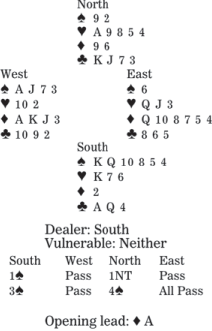Try to uncover another line of play
By Phillip Alder ( China Daily ) Updated: 2015-12-05 08:03:27

Abbe d'Allainval said, "The more alternatives, the more difficult the choice."
At the bridge table, the more alternative lines of play you have, often the more difficult your decision. However, some always go with the first option that they see, which happened when this deal was originally played. South was in four spades. West led the diamond ace and continued with the diamond king. After ruffing, what should declarer have done?
South's heart loser was going to disappear on dummy's fourth club, but trumps had to be drawn first.
The original declarer immediately led the spade king from his hand, but West defended perfectly by ducking. He saw that if he won and led another diamond, declarer would ruff in the dummy.
Instead, when South continued with a low trump at trick four, West stepped in with his jack and played a diamond. Declarer ruffed, but now both West and South had two spades left. Declarer led another trump, hoping West was out of diamonds, but no luck. South had to go down one, losing one diamond and three spades.
Declarer should have been happy to concede two trump tricks. At trick three, he should have led a low spade toward dummy's nine. If West won that trick and led a diamond, South would have ruffed in the dummy, crossed to his hand with a club, and played the spade king. He would have ruffed the next diamond, drawn trumps, and claimed. Or, if West ducked at trick four, declarer could have played a trump to his king, ruffed the next diamond, cashed the spade queen, and turned to clubs.
When the defenders wish to tap your hand, try to keep a trump in dummy with which to ruff.
|
|
|
|
|
|
|
|

























 Raymond Zhou:
Raymond Zhou: Pauline D Loh:
Pauline D Loh: Hot Pot
Hot Pot Eco China
Eco China China Dream
China Dream China Face
China Face






